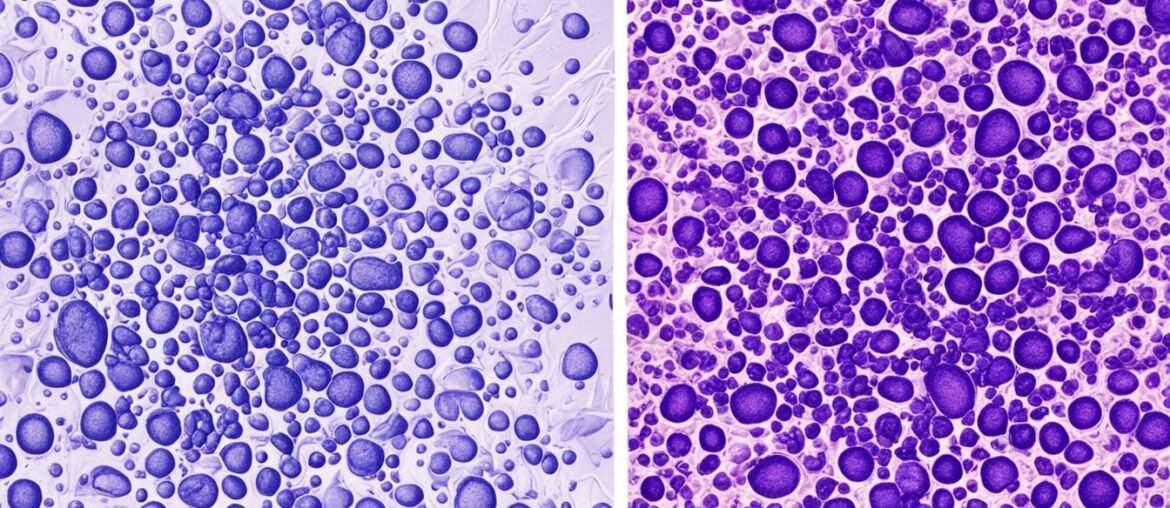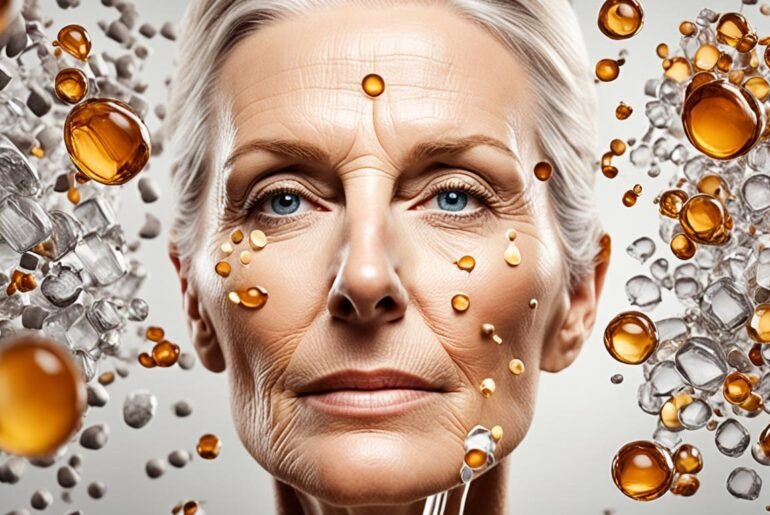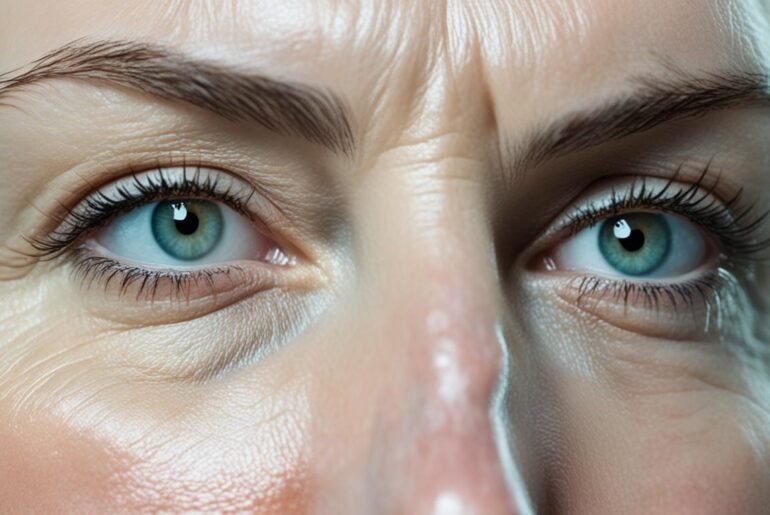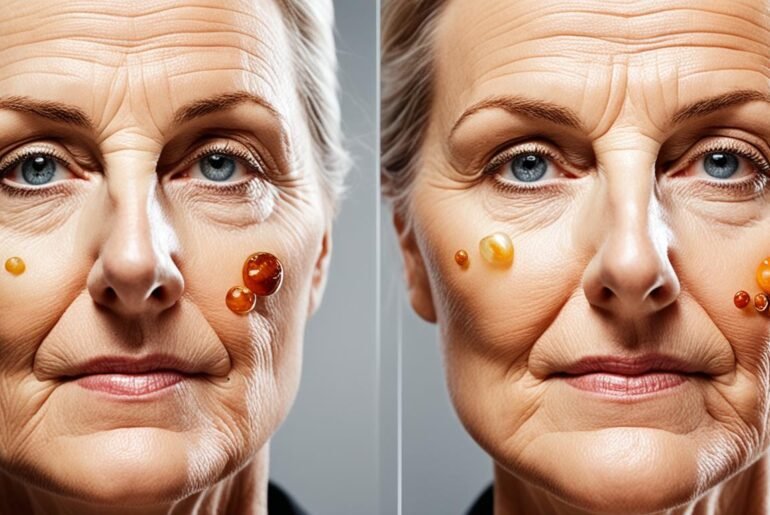Did you know that alcohol consumption can accelerate the aging process of skin cells, leading to wrinkles and sagging skin? It’s true! Studies have shown that alcohol has a significant impact on skin aging, causing premature signs of aging that can make you look older than you really are.
<!–
Image source: [Provide image source link]
–>
Alcohol affects the skin in various ways, including dehydration, inflammation, collagen depletion, dullness, acne breakouts, blood vessel dilation, and even DNA damage. Understanding the relationship between alcohol and skin aging is crucial for making informed lifestyle choices and preserving the youthful appearance of your skin.
Key Takeaways:
- Alcohol consumption can lead to premature skin aging.
- Alcohol can cause dehydration, leading to dryness, wrinkles, and sagging skin.
- Inflammation is a common effect of alcohol on the skin, resulting in redness and flushing.
- Alcohol depletes collagen production, causing wrinkles and sagging skin.
- Excessive alcohol consumption can lead to dullness, acne breakouts, and blood vessel dilation.
The Effects of Alcohol on Skin
Alcohol consumption can have several negative effects on the skin, impacting its health and appearance. Let’s explore some of the key ways alcohol can affect your skin:
Dehydration and Skin Dryness
Alcohol is a diuretic, which means it increases urine production and leads to dehydration. This dehydration can have a direct impact on your skin, causing dryness, wrinkles, and sagging. When the skin lacks moisture, it loses its elasticity, making it more prone to signs of aging. Staying properly hydrated and minimizing alcohol intake can help maintain the skin’s natural moisture balance and alleviate dryness.
Inflammation and Redness
Alcohol consumption can trigger inflammation in the skin, resulting in redness and flushing. This is especially noticeable in individuals with conditions like rosacea. Alcohol increases blood flow to the skin’s surface, causing the blood vessels to dilate. This persistent dilation can lead to the development of broken capillaries and spider veins over time. By minimizing alcohol consumption, you can reduce skin inflammation and minimize facial redness.
Collagen Depletion
Collagen is a protein responsible for maintaining the skin’s structure and elasticity. Alcohol consumption can interfere with collagen production, leading to a depletion of this vital protein. As collagen levels decrease, the skin loses its firmness and becomes more prone to sagging, wrinkles, and fine lines. Limiting alcohol intake and focusing on collagen-boosting skincare can help support the skin’s natural collagen production and maintain a youthful appearance.
Dull Skin and Uneven Texture
Alcohol can contribute to dull skin by disrupting the absorption of essential nutrients like vitamin A. This disruption can lead to decreased cell turnover and an overall lackluster complexion. Additionally, alcohol can impair the liver’s ability to process toxins, resulting in a buildup of waste products that further dull the skin. By reducing alcohol consumption and adopting a healthy skincare routine, you can restore radiance and promote a more even skin texture.
Acne Breakouts
Excessive alcohol consumption can disrupt the balance of hormones in the body, leading to increased sebum production. This excess oil, combined with dead skin cells and bacteria, can clog pores and result in acne breakouts. Alcohol-induced acne is often characterized by deep, inflamed pimples that can be difficult to treat. Reducing alcohol intake and practicing proper skincare hygiene can help prevent alcohol-related acne and promote clearer skin.
Blood Vessel Dilation
Alcohol causes blood vessels to dilate, leading to visible redness and flushing of the skin. This can be particularly noticeable in individuals with alcohol flush reaction or underlying skin conditions. Prolonged alcohol consumption can contribute to the development of permanent facial redness and an increased risk of broken blood vessels. By moderating alcohol intake, you can alleviate blood vessel dilation and reduce the appearance of facial redness.
DNA Damage and Premature Aging
Alcohol can cause oxidative stress and trigger the production of free radicals, leading to DNA damage in skin cells. This damage can accelerate the aging process, resulting in wrinkles, age spots, and a loss of skin elasticity. Minimizing alcohol consumption and adopting a healthy lifestyle can help protect the skin from DNA damage and prevent premature aging.
| Effects of Alcohol on Skin | Key Impacts |
|---|---|
| Skin Dehydration | Dryness, wrinkles, and sagging |
| Inflammation | Redness, flushing, and broken capillaries |
| Collagen Depletion | Loss of elasticity and increased signs of aging |
| Dull Skin | Decreased radiance and uneven texture |
| Acne Breakouts | Clogged pores and inflammation |
| Blood Vessel Dilation | Facial redness and broken blood vessels |
| DNA Damage | Premature aging and skin damage |
Understanding the effects of alcohol on the skin is essential for making informed decisions about your skincare routine and overall well-being. By minimizing alcohol consumption and adopting a holistic approach to skincare, you can promote healthier, more youthful-looking skin.
Alcohol’s Impact on Skin Aging
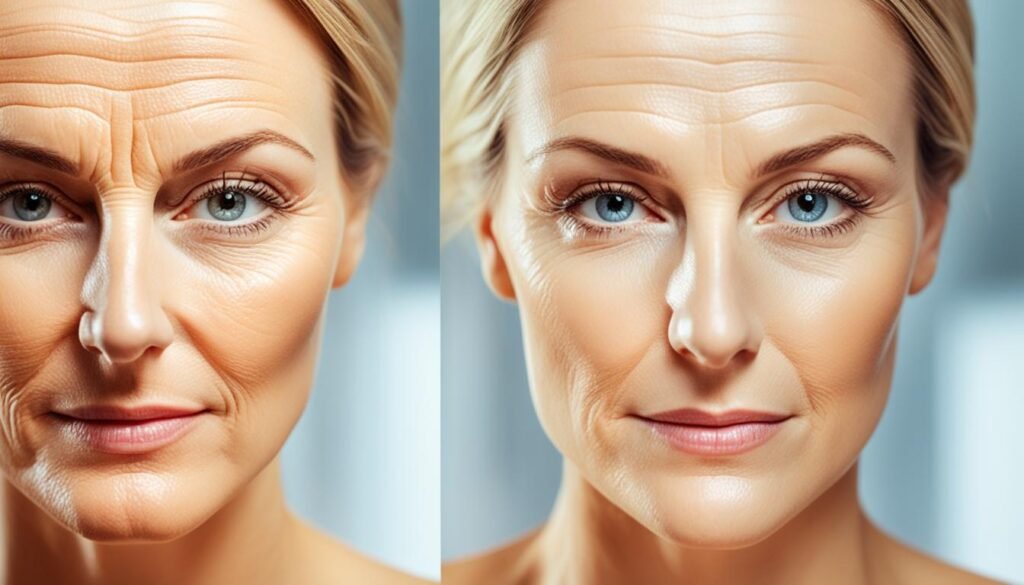
Alcohol consumption has been shown to contribute to premature skin aging. The negative effects of alcohol on collagen production can result in the formation of wrinkles, sagging skin, and a generally older appearance. The dehydration caused by alcohol also accelerates the aging process of the skin. By understanding the impact of alcohol on skin aging, individuals can make choices to reduce their alcohol consumption and preserve the health and appearance of their skin.
The Role of Alcohol in Premature Aging
Excessive alcohol consumption can lead to premature aging of the skin, characterized by the development of wrinkles and sagging. Alcohol inhibits collagen production, a vital protein responsible for maintaining the skin’s structure and elasticity. This depletion of collagen causes the skin to lose its firmness and resilience, resulting in visible signs of aging.
Furthermore, alcohol’s dehydrating effects play a significant role in accelerating skin aging. Alcohol acts as a diuretic, causing the body to expel more fluids, leading to dry and dull-looking skin. Dehydration can exacerbate the appearance of wrinkles and contribute to a tired and aged complexion.
The Impact of Alcohol on Collagen Production
Collagen is a crucial component of youthful and healthy-looking skin. It provides structure and firmness, allowing the skin to stay supple and smooth. However, alcohol consumption hinders collagen synthesis, causing a reduction in collagen levels. This decrease in collagen production weakens the skin’s support structure, leading to the formation of fine lines, wrinkles, and sagging skin.
Reducing Alcohol Consumption for Skin Health
To mitigate the negative effects of alcohol on skin aging, it is essential to reduce alcohol consumption. Limiting alcohol intake can help maintain optimal collagen levels and hydration, prolonging the youthful appearance of the skin. Additionally, individuals should focus on adopting healthy lifestyle habits, such as regular exercise, a balanced diet, and adequate sleep, to further support skin health.
By making conscious choices to minimize alcohol consumption and prioritize skin health, individuals can slow down the aging process and maintain a vibrant and youthful complexion for years to come.
Alcohol’s Role in Skin Dehydration
Alcohol consumption can have a significant impact on the hydration of the skin. When we consume alcohol, it reduces the amount of water available to our skin cells, leading to dryness and a lack of moisture. This dehydration can manifest as wrinkles, fine lines, and sagging skin, making us appear older than our actual age.
Hydration is essential for maintaining the health and youthfulness of our skin. When our skin lacks moisture, it becomes less resilient and more prone to damage. Additionally, inadequate hydration can impair the skin’s natural functioning, including its ability to regulate temperature, eliminate toxins, and produce essential oils.
To illustrate the effects of alcohol on skin dehydration, let’s compare two individuals: Sarah, who consumes alcohol excessively, and Emma, who avoids alcohol altogether.
| Alcohol Consumption | Skin Hydration | |
|---|---|---|
| Sarah | Excessive | Poor |
| Emma | No alcohol | Optimal |
As the table demonstrates, Sarah’s excessive alcohol consumption impairs her skin’s hydration, resulting in poor skin health. On the other hand, Emma’s decision to avoid alcohol allows her skin to maintain optimal hydration levels, promoting a youthful and radiant complexion.
Reducing alcohol intake can help mitigate the effects of skin dehydration and promote healthier, more hydrated skin. Choosing non-alcoholic alternatives or consuming alcohol in moderation can significantly improve skin hydration and overall skin health.
Remember, keeping your skin hydrated is essential for maintaining its elasticity, preventing wrinkles, and promoting a youthful appearance. Make conscious choices to reduce alcohol consumption and prioritize hydration for healthier, more vibrant skin.
Inflammation and Alcohol’s Impact on the Skin
Alcohol consumption can have detrimental effects on the skin, including the induction of inflammation and visible redness or flushing. The consumption of alcohol triggers a histamine reaction in the skin, leading to systemic inflammation and resulting in the appearance of facial redness. Continued alcohol consumption over time can exacerbate this condition, leading to prominent and persistent facial redness that can be difficult to reverse.
Understanding the connection between alcohol and skin inflammation is crucial for individuals looking to minimize the negative effects on their skin. By reducing alcohol intake, individuals can reduce the risk of alcohol-induced skin inflammation and mitigate the appearance of facial redness or flushing.
| Effects of Alcohol on Skin Inflammation | Impact on Skin Appearance |
|---|---|
| Alcohol-induced histamine reaction | Visible redness and flushing |
| Systemic inflammation | Prominent facial redness |
| Continued alcohol consumption | Persistent facial redness |
Collagen Depletion and Alcohol’s Effect on Skin Aging
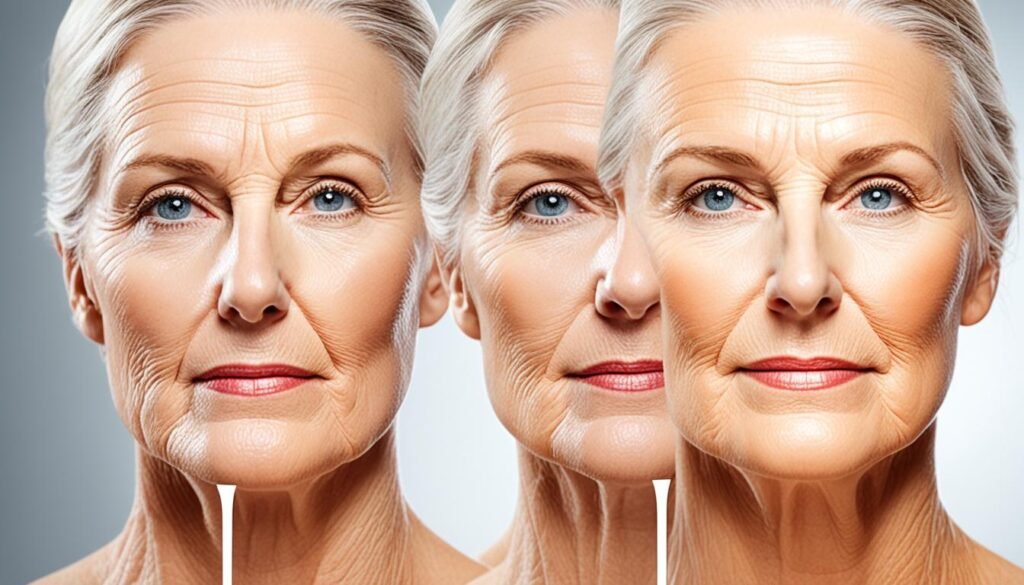
Alcohol consumption can have a detrimental effect on the production of collagen in the skin, which plays a crucial role in maintaining its structural integrity and elasticity. When collagen levels are depleted, the skin becomes more prone to developing wrinkles, sagging, and an overall aged appearance.
The negative impact of alcohol on collagen production emphasizes the importance of moderation or even avoidance of alcohol to preserve the health and youthfulness of the skin. By adopting a mindful approach to alcohol consumption, individuals can take proactive steps to minimize collagen depletion and the subsequent effects on their skin’s appearance.
It is essential to note that collagen depletion is a gradual process that occurs over time. Regular and excessive alcohol consumption can accelerate this depletion, leading to the premature aging of the skin.
The Role of Collagen in Maintaining Skin Health
Collagen is a protein that provides structural support to various tissues in the body, including the skin. In the context of skin health, collagen helps maintain firmness, elasticity, and a plump appearance. As we age, collagen production naturally decreases, resulting in the appearance of fine lines, wrinkles, and sagging skin.
Alcohol consumption exacerbates this natural process by interfering with collagen synthesis. Research has shown that alcohol inhibits the production of collagen by disrupting collagen gene expression and impairing the body’s ability to utilize collagen-building nutrients, such as vitamin C.
Furthermore, alcohol-induced inflammation in the skin can significantly contribute to collagen degradation. Inflammatory responses caused by alcohol consumption can lead to the activation of enzymes that break down collagen, further accelerating the aging process.
Regular and excessive alcohol consumption can disrupt collagen synthesis and exacerbate the natural aging process of the skin, leading to the formation of wrinkles and sagging skin.
Reducing Alcohol Consumption for Skin Health
To mitigate the effects of alcohol on collagen depletion and skin aging, it is advisable to adopt healthy drinking habits. Here are some tips:
- Drink alcohol in moderation, following the recommended guidelines for your gender and body weight.
- Alternate between alcoholic beverages and non-alcoholic options to reduce overall alcohol consumption.
- Stay hydrated by drinking plenty of water, as alcohol can dehydrate the skin and contribute to collagen loss.
- Focus on a nutrient-rich diet, including foods that promote collagen production, such as citrus fruits, leafy greens, and lean proteins.
- Engage in a skincare routine that includes products containing ingredients known to support collagen synthesis, such as retinol and peptides.
- Consider seeking professional advice from a dermatologist or skincare specialist for personalized recommendations.
By prioritizing skin health and making informed choices about alcohol consumption, individuals can help minimize the depletion of collagen and maintain the youthfulness and vitality of their skin.
Dullness and Alcohol’s Impact on the Skin
Drinking alcohol can have a significant impact on the radiance and vitality of your skin. One of the key effects of alcohol consumption is its ability to induce dullness in the skin, resulting in a loss of brightness and a lackluster appearance. This occurs due to the interference of alcohol with the skin’s ability to absorb essential nutrients, such as vitamin A.
Vitamin A plays a crucial role in maintaining healthy, radiant skin. It promotes cell turnover, helps repair damaged skin, and supports collagen production. However, when alcohol is consumed, it impairs the absorption of vitamin A, depriving the skin of this essential nutrient.
This deficiency can lead to a range of manifestations, including dullness, uneven skin tone, and compromised skin texture. Alcohol-induced dull skin is a direct result of the decreased availability of vitamin A, which is necessary for optimal skin health and radiance.
To counteract the negative effects of alcohol on skin radiance, it is advisable to reduce alcohol consumption. By doing so, you can enhance the absorption of vitamin A and other vital nutrients, restoring the natural glow and vibrancy of your skin.
Acne and Alcohol Consumption
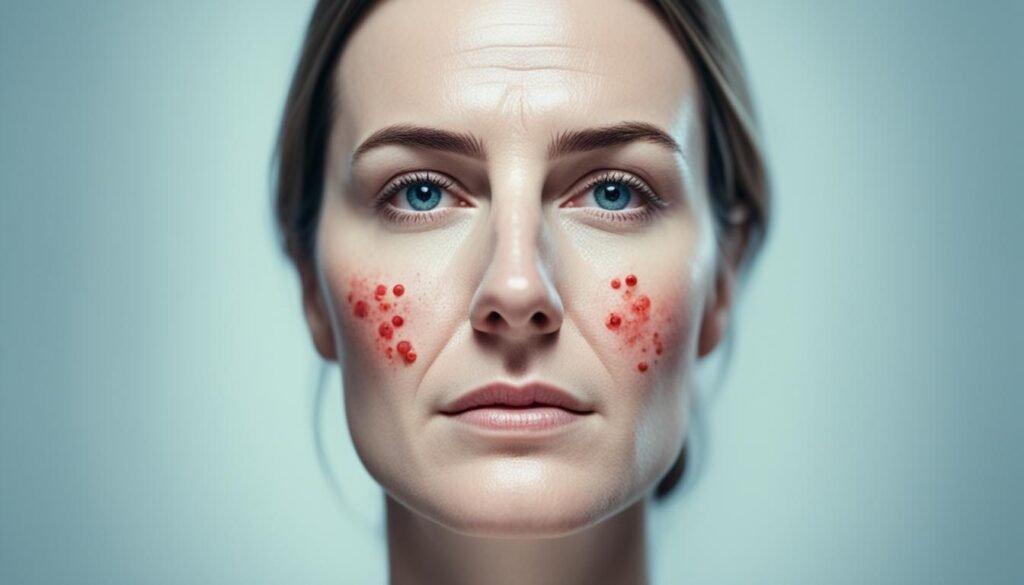
Excessive alcohol consumption can have a detrimental effect on the skin, leading to acne breakouts and blemishes. When alcohol is consumed in large quantities, it can increase the production of oils in the skin, known as sebum. This excess sebum, combined with dead skin cells, dirt, and bacteria, can clog the pores and result in the formation of blackheads, whiteheads, and pimples.
Reducing alcohol intake can help minimize the occurrence of alcohol-induced acne and improve the clarity and smoothness of the skin. By avoiding excessive alcohol consumption, individuals can support the overall health of their skin and reduce the risk of developing skin blemishes.
The Relationship Between Alcohol and Sebum Production
Alcohol has been found to increase sebum production in the skin, leading to oily skin and the potential for more frequent acne breakouts. Sebaceous glands, which produce sebum, are influenced by hormonal changes, and alcohol consumption can disrupt the balance of hormones in the body. This disruption can trigger an excess production of sebum, creating an environment that is conducive to the formation of acne.
“Excessive alcohol consumption can disrupt the hormonal balance and lead to an increase in sebum production, which can contribute to the development of acne.”
Improving Skin Health by Limiting Alcohol Intake
Reducing alcohol consumption is an essential step in managing and preventing alcohol-induced acne. By adopting healthier drinking habits or avoiding alcohol altogether, individuals can minimize the production of excess sebum and decrease the likelihood of acne breakouts. Additionally, maintaining a consistent skincare routine that includes cleansing, exfoliation, and the use of non-comedogenic products can further support skin health and prevent alcohol-related skin blemishes.
Taking Control of Your Skin’s Appearance
Understanding the effects of alcohol on the skin, particularly in relation to acne and sebum production, empowers individuals to make informed choices about their alcohol consumption. By prioritizing the health and appearance of the skin, individuals can reduce the occurrence of alcohol-induced acne and achieve a clearer, healthier complexion.
Alcohol’s Impact on Blood Vessels and Skin Redness
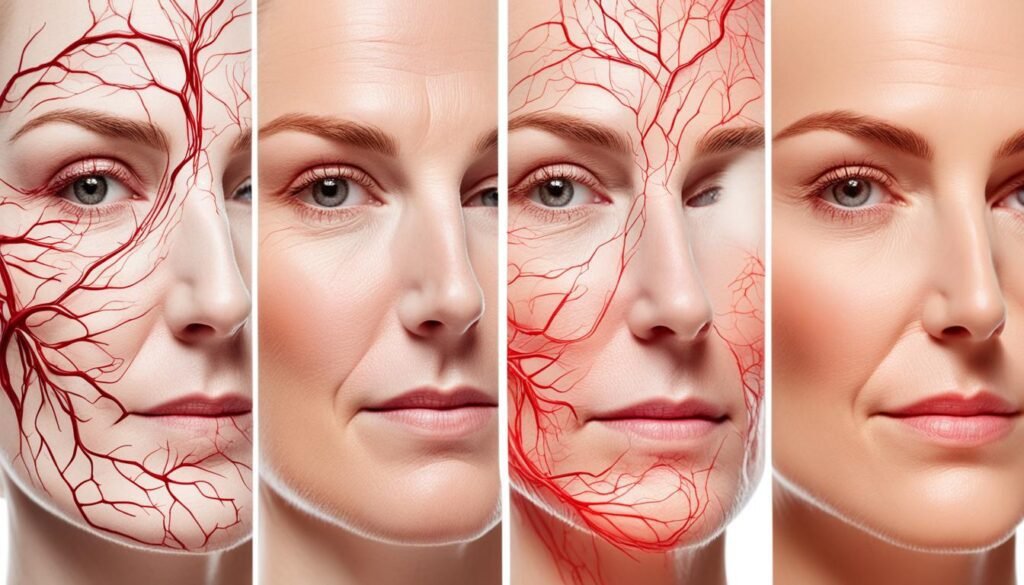
When it comes to alcohol consumption, one of the noticeable effects on the skin is blood vessel dilation, which can lead to facial redness and flushing. Excessive drinking causes the blood vessels in the skin to expand, resulting in a flushed appearance that is particularly prominent in areas like the cheeks, nose, and mouth.
Furthermore, prolonged and heavy alcohol consumption can also contribute to the development of spider veins or broken capillaries, adding to the overall redness and discoloration of the skin. These visible signs can be a cause for concern, as they not only affect the appearance but also indicate potential underlying health issues.
To minimize the appearance of facial redness and combat the negative effects of alcohol-induced blood vessel dilation, it is crucial to reduce alcohol consumption or even abstain from consuming alcohol altogether. By making this lifestyle change, individuals can help their blood vessels maintain their natural state and reduce the prominence of facial redness.
To visualize the effects of alcohol on blood vessels and skin redness, refer to the table below:
| Alcohol Consumption | Blood Vessel Dilation | Skin Redness |
|---|---|---|
| Excessive | Significant | Prominent |
| Moderate | Mild | Subtle |
| Minimal/None | Minimal/None | None |
Reducing alcohol consumption not only has a positive impact on blood vessel dilation and skin redness, but it can also promote overall skin health and appearance.
DNA Damage and Premature Aging from Alcohol
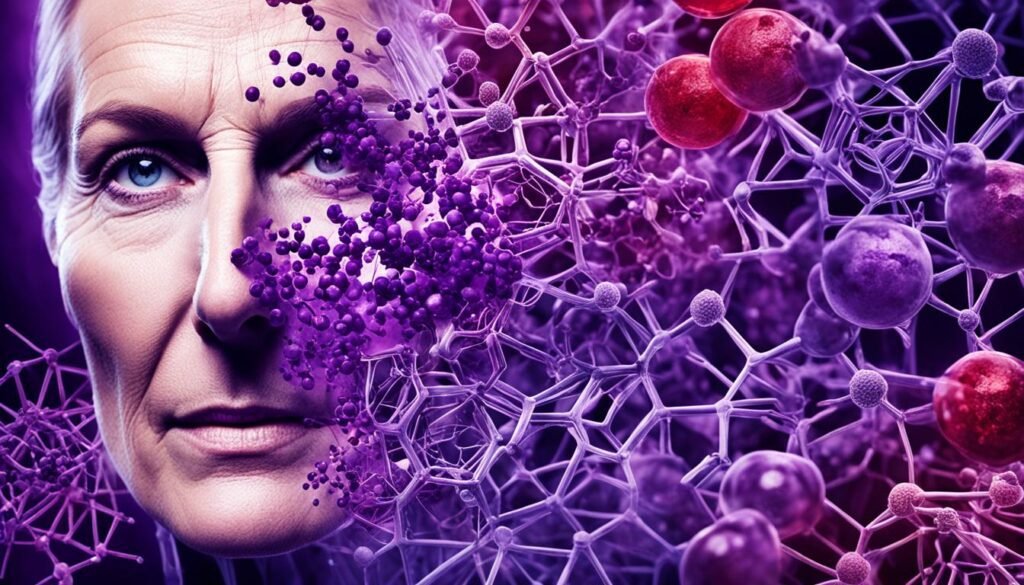
Drinking alcohol in excess can have detrimental effects on our skin’s DNA, leading to premature aging. When we consume alcohol, it triggers chronic inflammation and oxidative stress in our bodies. This, in turn, generates free radicals that can damage the DNA within our skin cells. Over time, the accumulation of this damage accelerates the aging process, causing the development of wrinkles and age spots.
This DNA damage is a result of alcohol’s impact on our body’s natural defense mechanisms. Our cells have built-in repair systems that usually fix DNA damage caused by environmental factors, but excessive alcohol consumption can overwhelm these mechanisms. As a result, the DNA damage accumulates faster than it can be repaired, leading to accelerated aging of the skin.
Understanding the connection between alcohol and DNA damage is crucial for making informed lifestyle choices that promote skin health and delay the signs of aging. By reducing alcohol consumption, we can minimize the risk of DNA damage and preserve the youthful appearance of our skin for longer.
The Role of Antioxidants in Protecting DNA
Antioxidants play a vital role in protecting our DNA from the damaging effects of alcohol. They neutralize the harmful free radicals generated during the oxidative stress caused by alcohol consumption. By increasing our intake of antioxidant-rich foods and beverages, we can provide our bodies with the tools necessary to counteract the DNA damage caused by alcohol.
Foods high in antioxidants include berries, dark leafy greens, nuts, and seeds. Additionally, incorporating antioxidant-rich beverages like green tea and herbal infusions into our daily routine can provide further protection against DNA damage.
The cumulative effects of alcohol-induced DNA damage can result in noticeable skin wrinkles and age spots.
Taking Steps Towards Skin Health
To mitigate the effects of alcohol-related DNA damage and premature aging, it is essential to take proactive measures for skin health:
- Limit alcohol consumption: By moderating our alcohol intake, we can minimize the risk of DNA damage and promote skin health.
- Maintain a balanced diet: Consuming a diet rich in antioxidants, vitamins, and minerals provides our bodies with the necessary nutrients to repair and protect DNA.
- Adopt a skincare routine: Incorporating a regular skincare routine that includes cleansing, moisturizing, and the use of antioxidant-rich skincare products can help protect the skin from environmental damage.
- Protect from UV radiation: Ultraviolet (UV) radiation from the sun can exacerbate DNA damage. Applying sunscreen and wearing protective clothing when exposed to the sun can help reduce the risk of additional skin damage.
By implementing these practices into our lifestyle, we can actively mitigate the effects of alcohol-induced DNA damage and promote skin health for a more youthful and vibrant appearance.
Other Factors Contributing to Premature Skin Aging
While alcohol consumption plays a significant role in premature skin aging, there are several other factors that can also contribute to the deterioration of skin health.
- Stress and Skin Aging: Chronic stress can have a negative impact on the skin, leading to accelerated aging. Stress triggers the release of cortisol, a hormone that can break down collagen and elastin, causing wrinkles and sagging skin.
- Smoking and Skin Aging: Smoking is known to contribute to premature skin aging. The chemicals in cigarette smoke can damage collagen and elastin fibers, leading to wrinkles, fine lines, and a dull complexion. Smoking also narrows blood vessels, reducing blood flow to the skin and depriving it of essential nutrients.
- Nutrition and Skin Health: Poor nutrition can affect the health and appearance of the skin. Diets high in processed foods and sugary beverages can result in inflammation and oxidative stress, which can accelerate the aging process. On the other hand, a balanced diet rich in antioxidants, vitamins, and minerals can help nourish the skin from within and maintain its youthful glow.
- Sun Exposure and Skin Aging: Excessive sun exposure is one of the primary causes of premature skin aging. UV radiation from the sun damages collagen fibers and triggers the production of free radicals, leading to wrinkles, age spots, and a loss of skin elasticity. Protecting the skin with sunscreen, wearing protective clothing, and seeking shade can help prevent sun-induced aging.
Addressing these factors and making positive lifestyle changes can help enhance the overall health and appearance of the skin. By managing stress levels, quitting smoking, adopting a healthy diet, and protecting the skin from sun damage, individuals can slow down the aging process and maintain youthful, vibrant skin.
It is essential to recognize that alcohol consumption is just one piece of the puzzle when it comes to premature skin aging. By taking a holistic approach to skincare and addressing all contributing factors, individuals can achieve optimal skin health and preserve their youthful complexion.
Conclusion
Alcohol’s role in skin cell aging is undeniable. The impact of alcohol on skin aging is multifaceted, with effects ranging from dehydration to collagen depletion, inflammation, dullness, acne, blood vessel dilation, DNA damage, and the development or exacerbation of skin disorders. Understanding the relationship between alcohol consumption and skin aging is crucial for making informed choices and prioritizing the health and vitality of our skin.
Reducing alcohol consumption and addressing other contributing factors can help preserve the youthfulness of our skin and promote overall skin health. By doing so, we can mitigate the negative effects of alcohol on our skin, minimize dehydration and inflammation, maintain collagen production, and restore radiance to our skin. Additionally, implementing positive lifestyle changes such as managing stress, quitting smoking, adopting a nutritious diet, getting adequate sleep, and protecting our skin from excessive sun exposure can further enhance the health and appearance of our skin.
It is important to recognize that alcohol-related skin aging is just one piece of the puzzle. Other factors, such as chronic stress, smoking, poor nutrition, inadequate sleep, and sun exposure, can also contribute to premature skin aging. By addressing these factors holistically and adopting a comprehensive approach to skin care, we can nurture and nourish our skin, preserving its youthfulness and promoting overall well-being.
FAQ
How does alcohol consumption affect the skin?
Alcohol consumption can have several negative effects on the skin, including dehydration, inflammation, collagen depletion, dullness, acne breakouts, blood vessel dilation, and DNA damage.
What role does alcohol play in premature skin aging?
Alcohol consumption has been shown to contribute to premature skin aging by accelerating the formation of wrinkles, sagging skin, and other signs of aging.
How does alcohol cause skin dehydration?
Alcohol consumption can lead to skin dehydration by reducing the amount of water available to the skin cells, resulting in dryness, wrinkles, and sagging skin.
Does alcohol cause inflammation in the skin?
Yes, alcohol consumption can cause inflammation in the skin, leading to redness and flushing.
How does alcohol deplete collagen production in the skin?
Alcohol consumption reduces collagen production in the skin, which can result in the formation of wrinkles, sagging skin, and an overall older appearance.
Does alcohol affect the skin’s radiance?
Yes, alcohol consumption can have a dulling effect on the skin, interfering with its ability to absorb vitamin A and leading to a loss of brightness and a dull appearance.
Can alcohol consumption contribute to acne breakouts?
Excessive alcohol consumption can increase the production of oils in the skin, leading to acne breakouts.
Does alcohol cause blood vessels to dilate and result in skin redness?
Yes, alcohol consumption causes blood vessels to expand, leading to redness, flushing, and the development of spider veins or broken capillaries.
Can alcohol consumption damage the DNA of skin cells?
Yes, chronic inflammation and oxidative stress caused by alcohol consumption can result in DNA damage in the skin cells, accelerating the aging process and leading to the development of wrinkles and age spots.
Are there other factors besides alcohol that contribute to premature skin aging?
Yes, chronic stress, smoking, poor nutrition, inadequate sleep, and excessive sun exposure are all factors that can accelerate the aging process of the skin.
How can I preserve the health and appearance of my skin?
By reducing alcohol consumption, managing stress levels, quitting smoking, maintaining a healthy diet and sleep routine, and protecting your skin from excessive sun exposure, you can promote the overall health and vitality of your skin.
What is the impact of alcohol on skin aging?
Alcohol consumption has been shown to have a significant impact on skin aging, leading to premature aging, collagen depletion, dehydration, inflammation, and other negative effects on the skin.
What should I do to maintain healthy and youthful skin?
To maintain healthy and youthful skin, it is important to make informed lifestyle choices such as reducing alcohol consumption, managing stress, adopting a healthy diet, getting adequate sleep, and protecting your skin from the sun.

